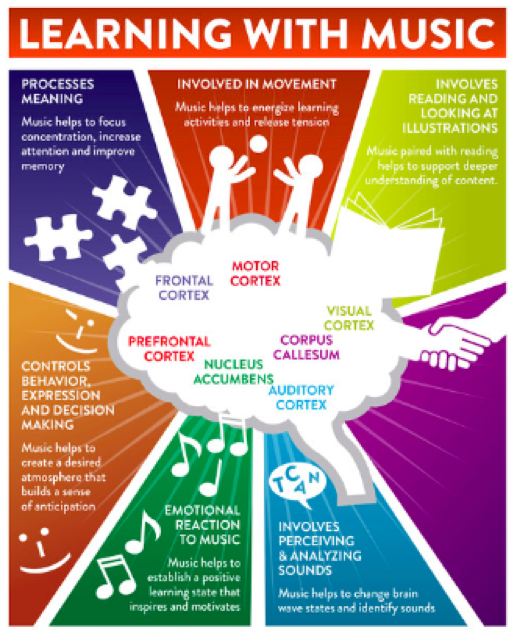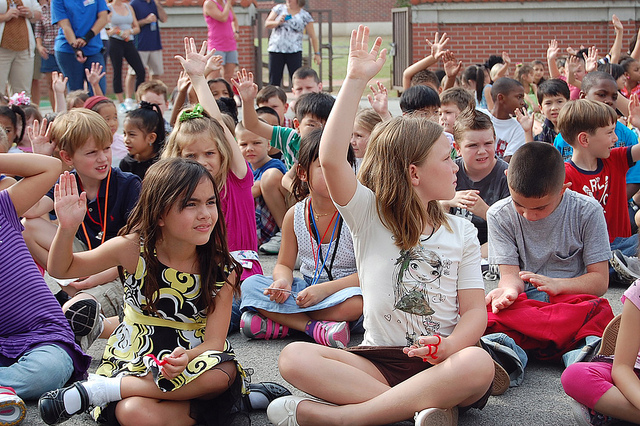10 Ways to Incorporate Music into Your Classroom

A teacher librarian shares her best practices for tuneful teaching
By Shannon McClintock Miller
“Music gives a soul to the universe, wings to the mind, flight to the imagination and life to everything.” ~Plato
One of the most important gifts we can give to our young children is a healthy foundation for lifelong learning. We want to capture their excitement, bottle their enthusiasm, and give life to their imagination. As educators, we look for resources that support and enhance these magical learning experiences. As shown in the Learning With Music infographic above, music stimulates and connects the different areas of the brain. For our youngest learners who are at a crucial time of development, this is an essential building block for their future.
In the article Music and Learning: Integrating Music in the Classroom from John Hopkins School of Education, Chris Boyd Brewer touts the benefits of using music throughout the day. “The intentional use of music in the classroom will set the scene and learning atmosphere to enhance our teaching and learning activities,” he writes. “Plus, using music for learning makes the process much more fun and interesting.”
Let’s look at 10 ways to incorporate music into your classroom, instruction, and library collection.
- Bookend your day with music. Music promotes listening and focus as we get started with our morning and as we end activities in the afternoon. This is also important with focusing children at home. At school or at home, songs can remind kids to wash their hands for snacks or clean toys up at the end of the day.
- Use music to establish a positive learning space. The right music creates the atmosphere you want for a given lesson, contributes to the community of the classroom, and builds rapport. The new series School Time Songs from Cantata Learning sets a fun tone for everything you do.
Cantata’s books combine stories, illustrations, and songs to captivate young learners, build literacy skills, and instill a lifelong love of reading. In the back of each book there is a CD that contains the song. You can also find all of the music online by scanning a QR code included three places within each book.
- Inspire your students to release energy and tension throughout the day. Whether for one student or a gym full of kids, brain breaks fueled by music motivate kids to get some healthy exercise and help them refocus on learning.
- When you kick off a new topic or lesson, really hook your students with music. Music will reinforce new information. It can be paired with other resources, such as non-fiction and research, to provide guiding questions and bring new concepts to life.
- Use music to enhance imagination. We all know that kids love to dream about who they might be someday. With the new STEM series from Cantata Learning, they can do just that by taking a closer look into science, technology, engineering, and math information, careers and interests.
- Engage students’ brains to learn and memorize. Kelly Benge, who is a 5th-grade special education teacher in Iowa, uses the Read, Sing, Learn…Songs About the Part of Speech series to teach her class to identify the parts of speech. Benge said, “The music engages the brain to learn and memorize in ways nothing else can. The songs draw in the interest of students, especially those who get easily distracted.”
- Teach students to be more receptive and sensitive to understanding things differently. The Mad Monkey, from the Songs About Emotions series, takes a look at the social emotional aspect of children. It will help them understand others’ emotional perspectives, too.
- Use music as a collaborative tool among teachers. One of my favorite new series is Fairy Tale Tunes. Just think how perfect these are for a “fractured fairy tale” unit! This is an important piece of the curriculum which holds lots of potential for collaboration among teachers within the classroom, art, music, and library.
- Facilitate a multisensory learning experience in a musical makerspace. Heather Fox, who is a teacher librarian in Iowa, set up a musical makerspace in her library by placing Cantata Learning book covers in a display and having students use iPads to scan the QR codes to listen, read, and sing. As part of the multisensory learning experience, they could also create musical instruments in a station she set up out of recycled goods.
- Bring fun to learning! Karyn Lewis, who is a teacher librarian in Texas, wrote, “I invited the pre-K and kindergarten English language learner students to the library once a week to work on vocabulary using several of the Cantata Learning ebooks and songs. We couldn’t help but sing, clap, and dance along to the books we read together! They requested to play the song again and again.”
Music will bring noise to classrooms and libraries, but ultimately it creates lifelong learners through stories, movement, curiosity, collaboration, rhythm, and fun!
Shannon McClintock Miller is a teacher librarian, international speaker, consultant, and author. She is a recipient of the 2014 Library Journal Mover & Shaker Award and the 2016 ISTE Make It Happen Award. Follow her on Twitter at @shannonmmiller.






